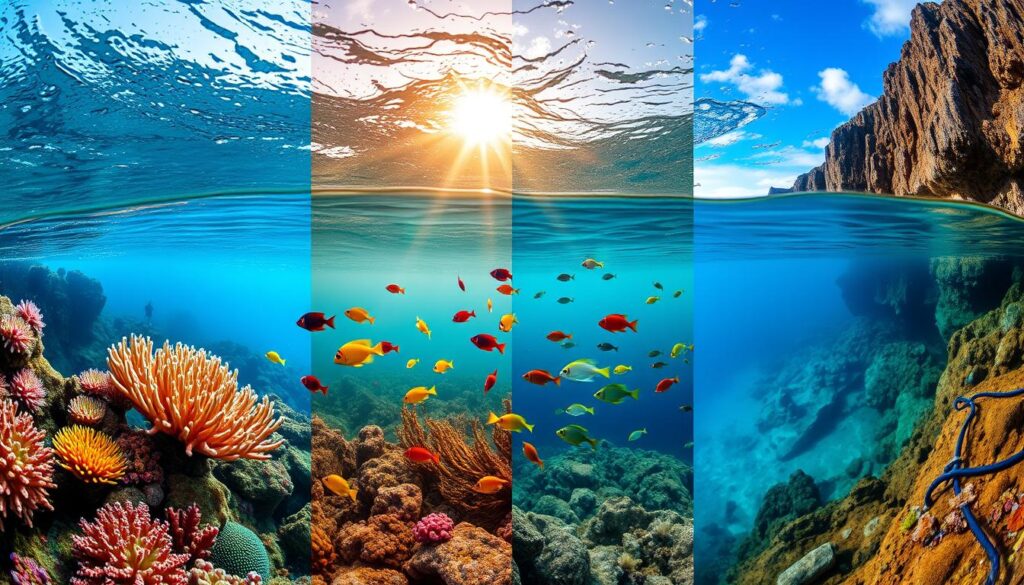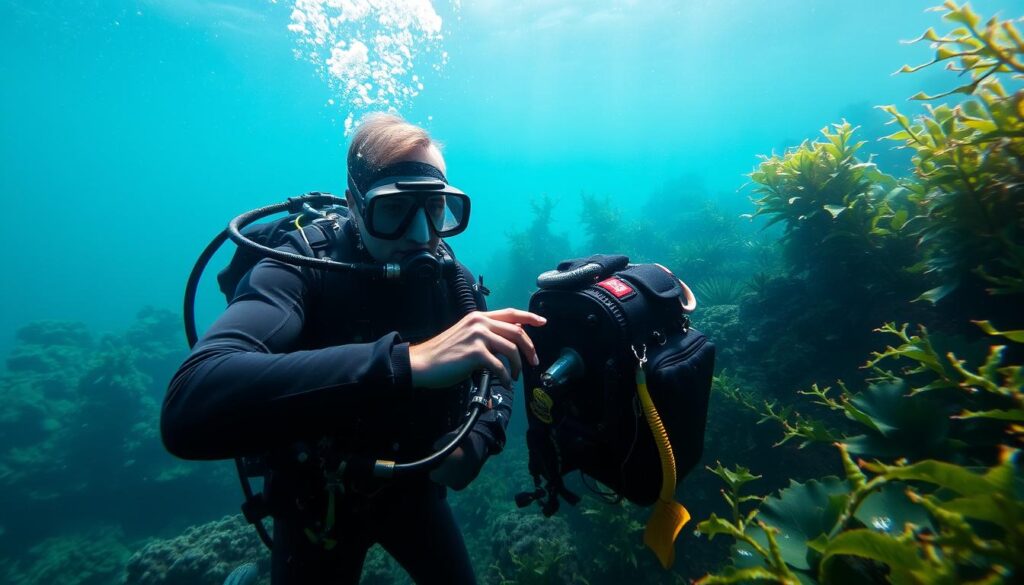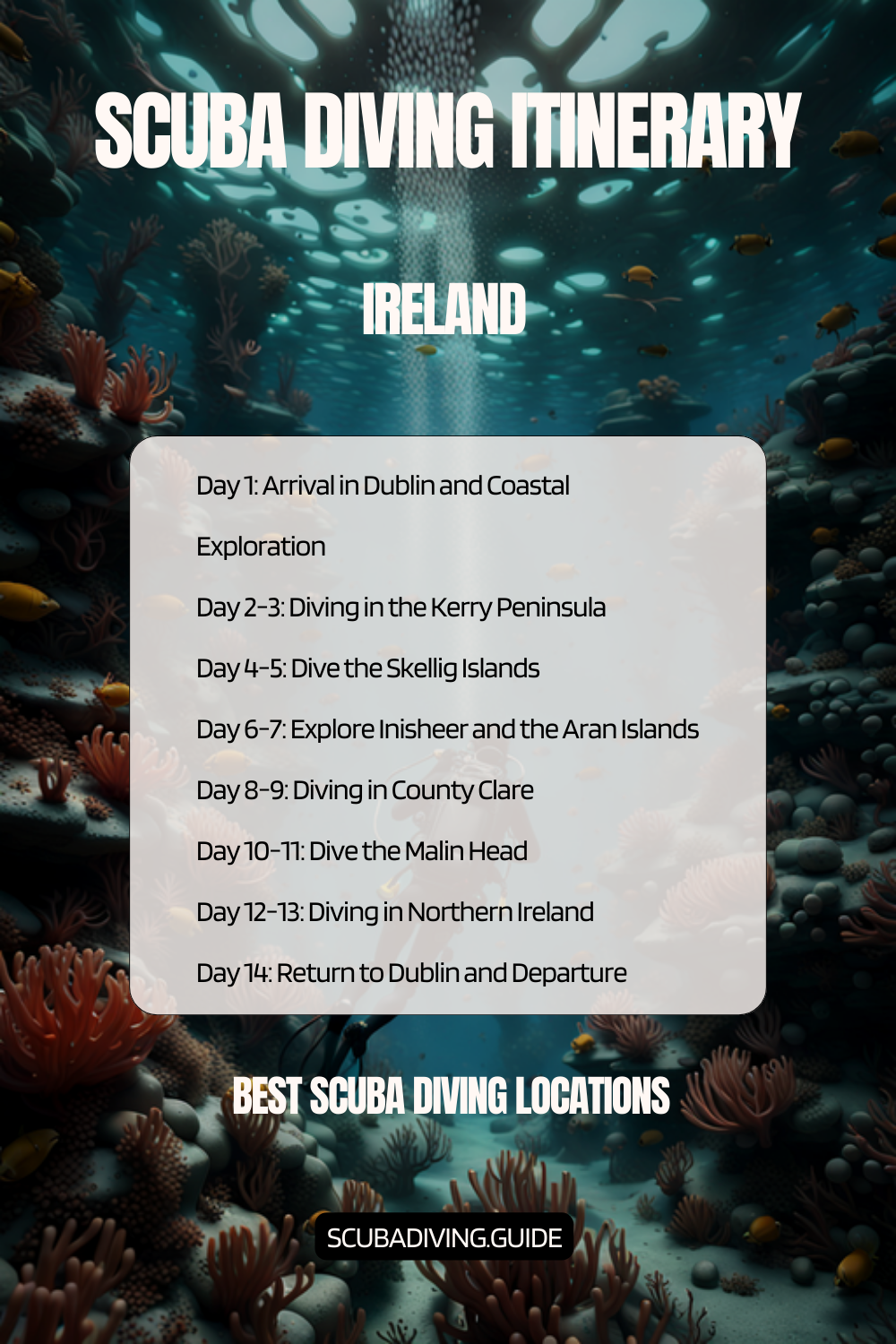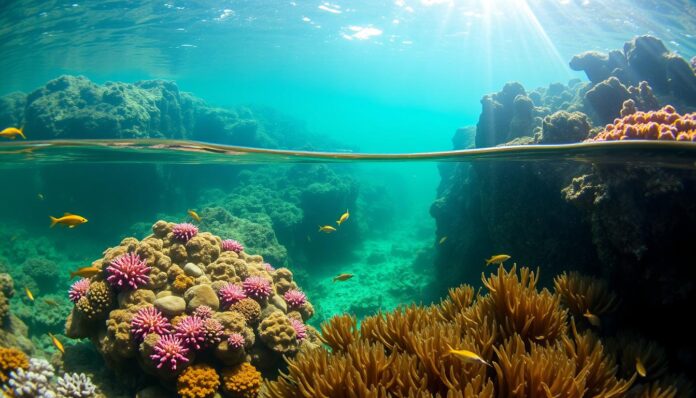| Best Time to Travel | May to October |
| What to Expect | Visibility of up to 60 feet, chilly water (50-60°F), varied marine life |
| Diving Conditions | Year-round diving, but best during the summer (warmer water, calmer seas) |
| Marine Life | Wrecks, kelp forests, seals, dolphins, sharks, wrasse, lobsters |
Are you ready to explore an underwater world that challenges everything you thought you knew about diving destinations? Ireland might just be the most unexpected treasure trove for scuba enthusiasts seeking extraordinary marine adventures.
Scuba diving in Ireland offers a mesmerizing experience that goes far beyond traditional expectations. The Emerald Isle’s coastline reveals a spectacular underwater realm. Here, nutrient-rich Atlantic currents create an ecosystem teeming with marine life and historical wonders.
From the UNESCO World Heritage Skellig Islands to the historic shipwrecks scattered along the rugged coastline, Irish dive sites promise an unparalleled underwater journey. Whether you’re a novice or an experienced diver, the Irish waters welcome you. They offer diverse marine landscapes and incredible biodiversity.
Key Takeaways – Scuba Diving in Ireland
- Best diving season runs from May to September
- Water temperatures range from 12°C to 16°C
- Dive sites suitable for all experience levels
- Unique marine ecosystems and wildlife encounters
- Historical underwater sites like shipwrecks
- UNESCO World Heritage marine environments

Overview of Scuba Diving in Ireland
Ireland offers a unique underwater experience that goes beyond the usual. Its dramatic coastline and rich marine life make it a special place for divers. It’s not like the typical tropical spots.
Exploring Ireland’s underwater world is a chance to see amazing marine landscapes. The Atlantic Ocean’s influence brings a world full of biodiversity and stunning formations.
Why Choose Ireland for Scuba Diving?
Ireland is great for diving for many reasons:
- Diverse Marine Life Ireland environments
- Unique underwater topography
- Historical shipwreck sites
- Relatively stable water temperatures
Unique Marine Ecosystems in Ireland
The marine ecosystems in Ireland are truly unique. They’re shaped by the Gulf Stream and Atlantic currents. Divers can see a wide range of marine species in places like rocky coastlines and kelp forests.
| Diving Condition | Details |
|---|---|
| Water Temperature | 50°F (10°C) in winter to 65°F (18°C) in summer |
| Visibility | 5-30 metres (15-100 feet) |
| Dive Season | March to October |
“Ireland’s underwater world offers a diving experience that is both unexpected and unforgettable.”
Ireland’s marine life is incredibly diverse. You can see wrasse, sea urchins, anemones, dolphins, porpoises, and even whales. The mix of cold and warm water currents makes it a unique habitat for marine lovers worldwide.
Best Scuba Diving Locations in Ireland
Ireland’s coastline is a treasure trove for scuba diving. It’s home to historic shipwrecks and vibrant marine life. Dive Travel Ireland offers experiences that match the world’s top diving spots.
With over 10,000 shipwrecks, Ireland’s underwater world is vast and mysterious. Each dive site has its own tale, waiting to be discovered.
Antrim Coast: A Hidden Gem
The Antrim Coast is a must-see for divers. It boasts dramatic underwater landscapes. Here, you can see:
- Submerged cliff faces
- Rich marine biodiversity
- Unique geological formations
The Great Barrier Reef of Europe
Ireland’s west coast is home to incredible underwater ecosystems. It rivals tropical marine environments. You’ll find:
- Vibrant soft corals
- Diverse sponge species
- Extensive marine life populations
| Dive Site | Depth Range | Unique Features |
|---|---|---|
| MV Kowloon Bridge | 20-105 feet | Largest European wreck with $2.6 million iron ore cargo |
| Blasket Island | 50-89 feet | USS Quebra wreck site |
| Fanore | 50 meters from shore | Dolphin encounter location |
The Clear Waters of County Kerry
County Kerry is known for its crystal-clear waters. Visibility can reach up to 30 meters. The Skellig Islands and Dingle Peninsula are perfect for underwater photography.
“Every dive in Ireland is an adventure into a hidden maritime world.” – Irish Diving Enthuasiast
Water temperatures range from 10°C in winter to 18°C in summer. Summer is the best time for diving.
Scuba Diving Seasons in Ireland
Dive Travel Ireland offers an amazing underwater adventure from early spring to late autumn. The Irish Coastline Diving experience changes with the seasons. This makes timing very important for those who want the best underwater experience.

To dive in Ireland, you need to plan and know the local sea conditions. The best time to dive is from March to October. These months offer the best underwater adventures.
The Best Times to Dive
Here are the best months for diving:
- May to September: Peak diving season
- Water temperatures range from 12°C to 16°C (54°F-60°F)
- Visibility reaches up to 29 meters (95 feet)
Weather Considerations for Divers
Irish waters have their own challenges. The Atlantic weather can change diving conditions quickly. It’s important to check the weather forecast before diving.
| Season | Diving Conditions | Marine Life Activity |
|---|---|---|
| Spring (March-May) | Improving visibility | Early marine migrations |
| Summer (June-August) | Best diving conditions | Peak marine biodiversity |
| Autumn (September-October) | Decreasing temperatures | Pre-winter marine movements |
“The sea does not reward those who are too anxious, too greedy, or too impatient.” – Anne Morrow Lindbergh
For those diving in Ireland, being prepared is essential. You’ll need a 7mm wetsuit or drysuit, hood, gloves, and boots. It’s also important to check the local diving conditions and talk to experienced dive centers for the latest information.
Equipment Rentals and Dive Schools
Getting ready for an underwater adventure in Ireland needs careful planning and the right gear. Dive Equipment Rental Ireland provides a wide range of options for a safe and fun dive in Ireland’s beautiful marine spots.
Finding your way through Dive Certification Ireland can be tricky, but local dive shops make it easy and fun. Whether you’re new to diving or have lots of experience, knowing what gear you need is key.
Top Dive Shops for Equipment Rental
- Dublin Dive Center: Offers full gear rental packages
- Atlantic Diving School: Specializes in complete equipment solutions
- Kerry Marine Adventures: Provides top-notch rental gear
Essential Gear Rental Pricing
| Equipment | Half Day Rate | Full Day Rate |
|---|---|---|
| Full Gear Rental | €40 | €80 |
| Dry Suit Rental | €25 | €45 |
| BCD Rental | €10 | €15 |
| Mask and Snorkel | €5 | €7 |
Recommended Personal Gear
When getting ready for Irish waters, think about bringing or renting:
- Thermal protection: 7mm wetsuit or drysuit
- Dive computer
- Mask and snorkel
- Diving gloves
- Dive boots
“Proper equipment is the key to an unforgettable underwater experience in Ireland’s magical marine world.”
Dive Certification Ireland programs often suggest gear based on local conditions. Prices for courses range from €495 for Open Water Referral to €795 for advanced programs.
Types of Diving Experiences Available
Ireland’s underwater world is full of amazing diving adventures. Divers can explore mysterious shipwrecks and vibrant marine ecosystems. They can dive into a world rich with maritime history and natural wonders.
Wreck Diving Adventures in Ireland
Wreck Diving Ireland is a unique chance to see sunken treasures. The Irish coast has many historical ships waiting for brave divers to find them.
- Explore World War-era shipwrecks
- Uncover maritime historical sites
- Dive depths ranging from 50 to 90 feet
Kelp Forest Explorations
The kelp forests along Ireland’s coast are full of life. Divers can swim through these green underwater worlds. They’ll see unique species and experience a magical place.
| Marine Species | Typical Size |
|---|---|
| Common European Lobster | 2 feet long |
| Small-spotted Catshark | 3 feet maximum |
Night Diving: A Unique Perspective
Night diving in Ireland turns the ocean into a magical place. Bioluminescent organisms and creatures of the night offer a stunning view. It’s a chance to see the ocean in a whole new way.
“The ocean at night is a canvas of mysterious beauty, waiting to be explored.” – Irish Diving Expert
Irish waters are perfect for diving, with temperatures from 8 to 18 degrees Celsius. Visibility is great, ranging from 8 to 15 meters. It’s a place for unforgettable underwater adventures.
Safety Considerations for Divers
Dive Safety Ireland needs careful planning and sharp awareness. Scuba diving in Ireland’s beautiful waters requires a detailed safety plan. It’s more than just basic safety steps.

Diving comes with its own set of challenges. About one-third of scuba diving deaths could be avoided. This is through regular health checks and proper preparation.
Essential Safety Checks Before Diving
Before diving in Irish waters, do a full check of your gear and health. Dive Certification Ireland suggests these important safety steps:
- Check your equipment thoroughly
- Make sure you’re healthy enough to dive
- Verify your buddy system
- Check the diving environment
Understanding Local Diving Regulations
Irish diving rules are in place to keep divers and marine life safe. Key points include:
- Don’t dive deeper than 40 meters
- Get certified for certain dive spots
- Use the right safety gear
“Always plan your dive and dive your plan” – A key rule for safe diving in Ireland.
Certified divers should know that most insurance covers dives up to 40 meters. Get a medical check before diving, even if it’s your first time or you dive rarely.
Important safety tips include:
- Wait 24 hours after diving before flying
- Raise slowly (30 feet per minute max)
- Do a three-minute safety stop at 15 feet
- Tell someone if you feel odd
Dive safety is more than just gear and rules. It’s about being responsible and aware. By following these tips, divers can have a safe and unforgettable time in Ireland’s stunning underwater world.
Wildlife Encounters Underwater
Ireland’s coastal waters are home to a world of Marine Life Ireland. Divers from all over are drawn to this place. Underwater Exploration Ireland shows us a world full of amazing marine creatures.
The underwater world around Ireland is full of life. Divers can see many different species. These creatures live in the waters around Ireland.
Common Marine Species to Discover
- Grey seals playfully darting through kelp forests
- Dolphins swimming in coastal waters
- Colorful wrasse and pollack fish
- Large conger eels hiding in rocky crevices
- Vibrant nudibranchs and sea slugs
Endangered Species and Conservation
Some marine animals need our help. Basking sharks, the big ones, are very important to protect.
“Every dive is an opportunity to witness and protect the incredible marine ecosystems of Ireland.”
Conservation is key. Divers help by exploring underwater responsibly. They also support local efforts to protect the sea.
Unique Marine Ecosystems
Ireland’s underwater world is very diverse. Places like Killary Harbor and Dublin Bay are full of life. Each dive is a chance to see something new and beautiful.
| Location | Typical Marine Life | Visibility Range |
|---|---|---|
| Dublin Bay | Grey seals, crabs, lobsters | 15-50 feet |
| Killary Harbor | Octopuses, blue lobsters | 33-65 feet |
| Tory Island | Diverse fish species | Up to 98 feet |
Divers can enjoy and protect Ireland’s underwater world. By taking care of these places, we can keep them beautiful for future generations.
Dive Trips and Guided Tours
Exploring Ireland’s underwater world is more than just diving. Dive Travel Ireland offers amazing chances for both new and seasoned divers. They get to see the rich marine landscapes of Irish Dive Sites.
Without local knowledge, diving in Ireland’s diverse marine environments can be tough. Guided dive tours are a great way to see the country’s underwater wonders safely and fully.
Joining a Local Dive Tour
Local dive tours offer big benefits for underwater explorers:
- Expert navigation through complex coastal conditions
- Intimate knowledge of marine ecosystems
- Safety support for challenging dive locations
- Insights into local marine wildlife
“The best way to understand Irish waters is through the eyes of a local guide.” – Irish Diving Association
Custom Dive Packages for Groups
Group diving in Ireland is all about tailored adventures for different skill levels. Many operators have special packages for groups. They’re designed to meet specific needs.
| Package Type | Duration | Skill Level | Price Range (EUR) |
|---|---|---|---|
| Beginner Group Tour | 2-3 Days | Novice | 250-400 |
| Advanced Expedition | 4-5 Days | Experienced | 500-750 |
| Custom Private Tour | Flexible | All Levels | 750-1500 |
Ireland has over 1,500 documented dive sites. It saw a 20% rise in guided tour bookings from 2022 to 2023. It’s a top diving spot for fans around the world.
Training and Certification Programs
Diving fans in Ireland can dive into underwater adventures with professional training. Dive Certification Ireland offers detailed training for both newbies and seasoned divers. This is to boost their diving skills.
In Ireland, PADI and SSI are the top certification agencies. They each have their own way of teaching diving. Knowing about these programs helps you pick the best path for your diving adventure.
PADI Certification Opportunities
PADI has various certification levels for different skill levels:
- Scuba Diver certification (minimum age 12-15)
- Open Water Diver course
- Advanced diving specialties
PADI certifications stand out because of:
- Flexible home-study materials
- Multimedia learning options
- Supervised diving to 12 metres maximum for initial certification
Choosing the Right Course for You
Dive Safety Ireland suggests thinking about these points when picking a diving course:
- Current skill level
- Time availability
- Personal diving goals
- Specific interest areas (wreck diving, marine exploration)
“Your diving certification is the gateway to exploring Ireland’s magnificent underwater world.”
Most diving schools in Ireland offer flexible training options. These include:
- Evening classes: Typically 3 weeks, every Tuesday
- Intensive programs: 5-day courses from 9:00 AM to 5:30 PM
- Customized schedules: Tailored to individual needs
Whether you’re new to diving or have lots of experience, Ireland’s strong certification programs offer thorough training. They help you explore Ireland’s beautiful underwater world safely.
The Role of Dive Guides
Dive guides are key to keeping divers safe in Ireland’s waters. They know the waters well, from cold temperatures to hidden spots. Their knowledge helps divers face challenges and find amazing underwater sights.
Importance of Local Knowledge
Expert dive guides know Ireland’s waters inside out. They guide through kelp forests and around wrecks like the MV Kowloon Bridge. Their knowledge helps divers stay safe, even when the water is murky.
How Dive Guides Enhance Your Experience
Certified dive guides do more than keep you safe. They teach about marine life and help spot special creatures. With over 180 PADI dive centers, they make every dive a learning and fun experience.
Ireland Recommended Scuba Diving Itinerary
To make the most of your scuba diving adventure in Ireland, it’s essential to plan a well-rounded itinerary that allows you to explore a variety of dive sites while experiencing the country’s rich culture and natural beauty. Here is a recommended scuba diving itinerary that encompasses some of Ireland’s top diving locations:
Day 1: Arrival in Dublin and Coastal Exploration
Upon arrival in Dublin, take some time to settle in and acclimate to the local time. Explore the vibrant city, visit historic landmarks like Dublin Castle or Trinity College, and indulge in traditional Irish cuisine at a local pub.
Day 2-3: Diving in the Kerry Peninsula
Travel to the Kerry Peninsula, known for its stunning landscapes and excellent diving opportunities. Spend a couple of days exploring dive sites such as Dingle Bay, where you can encounter colorful marine life, underwater cliffs, and fascinating rock formations. After the dives, take in the breathtaking scenery along the famous Ring of Kerry.
Day 4-5: Dive the Skellig Islands
Head to the southwest coast and embark on a thrilling dive adventure to the Skellig Islands. Dive beneath the towering cliffs and discover the rich marine life, including playful seals, schools of fish, and possibly even basking sharks. Don’t miss the opportunity to visit the famous monastic settlement on Skellig Michael, a UNESCO World Heritage site.
Day 6-7: Explore Inisheer and the Aran Islands
Travel to the Aran Islands and focus on exploring the dive sites around Inisheer. Dive the reefs, underwater pinnacles, and explore the diverse marine ecosystems. Take time to soak in the island’s unique charm, visit ancient stone forts, and experience traditional Irish music sessions in local pubs.
Day 8-9: Diving in County Clare
Make your way to County Clare, where you’ll have the opportunity to dive in captivating locations such as Loop Head and the wrecks near Ballycotton. Explore underwater caves, swim through arches, and encounter a variety of marine species. Don’t miss the chance to visit the iconic Cliffs of Moher and enjoy the scenic coastal views.
Day 10-11: Dive the Malin Head
Venture to County Donegal and immerse yourself in the beauty of Malin Head. Dive along the steep drop-offs and explore the rocky underwater terrain. Encounter an array of marine life, including dogfish, pollack, and colorful anemones. Take time to explore the picturesque landscapes of Donegal, including the stunning Glenveagh National Park.
Day 12-13: Diving in Northern Ireland
Travel to Northern Ireland and dive the fascinating dive sites along its coast. Explore the underwater world of Strangford Lough, with its diverse marine ecosystems and historic shipwrecks. Take the opportunity to visit the iconic Giant’s Causeway, a natural wonder formed by unique geological formations.
Day 14: Return to Dublin and Departure
Head back to Dublin, taking in any sights you may have missed on your arrival day. Explore the city’s vibrant neighborhoods, shop for Irish souvenirs, and savor a final meal of traditional Irish fare. Depart with memories of your unforgettable scuba diving journey in Ireland.
Note: This itinerary is a suggestion and can be modified based on personal preferences, time constraints, and the availability of dive sites and accommodations. It is important to consult with local diving centers, check weather conditions, and plan accordingly to ensure a safe and enjoyable diving experience.
With this recommended scuba diving itinerary, you can explore the diverse dive sites of Ireland while immersing yourself in the country’s rich history, breathtaking landscapes, and warm hospitality. Prepare to dive into a world of underwater wonders and create lifelong memories in the emerald isle of Ireland.

Other Countries to Consider
FAQ – Scuba Diving in Ireland
What is the best time of year to go scuba diving in Ireland?
The best time to dive in Ireland is from late spring to early autumn (May to September). The water is warmer, visibility is better, and marine life is active. But, experienced divers can dive all year with the right gear.
Do I need special certification to dive in Ireland?
You don’t need Ireland-specific certification. But, you should have an Open Water Diver certification from PADI or SSI. Advanced certifications and cold-water diving experience are recommended.
What type of marine life can I expect to see while diving in Ireland?
Ireland’s waters are home to seals, dolphins, fish, and basking sharks in summer. You’ll see soft corals, sponges, and kelp forests. These provide homes for many marine creatures.
What equipment should I bring for diving in Ireland?
You’ll need a good wetsuit or drysuit because the water is cold. A thick wetsuit, hood, gloves, boots, and a dive computer are recommended. Many shops in Ireland rent out equipment.
Are there good wreck diving opportunities in Ireland?
Yes! Ireland’s history offers many shipwrecks to explore. Wreck diving is a highlight, with sites along the Antrim Coast and west coast.
How cold are the waters for diving in Ireland?
Water temperatures range from 8°C (46°F) in winter to 15°C (59°F) in summer. Proper thermal protection is key. Divers use drysuits or thick wetsuits with layers.
Do I need to book a guided dive tour?
A guided tour is a good idea, even for experienced divers. Guides know the best sites, help with navigation, and share insights on marine life and conditions.
What are the most popular dive sites in Ireland?
Top sites include the Antrim Coast, the west coast’s “Great Barrier Reef of Europe”, and County Kerry’s clear waters. The Skellig Islands and Dingle Peninsula are famous for their beauty and marine life.
Is scuba diving in Ireland safe?
Yes, diving in Ireland is safe with the right precautions. Dive within your skill level, use proper gear, check conditions, and follow certified operators’ advice. Many prioritize diver safety.
Can beginners go scuba diving in Ireland?
Yes, Ireland is great for beginners. Dive schools offer courses and guided dives for new divers. But, cooler waters and challenges mean you should have some experience and proper gear.
